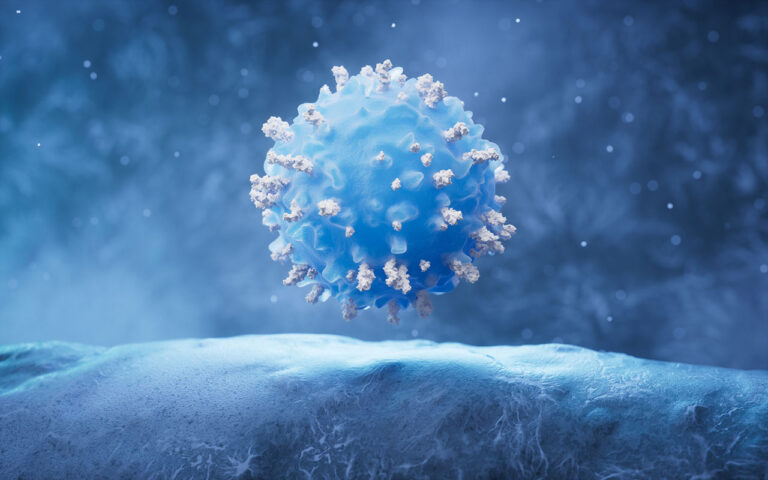
Inhibidores de los puntos de control inmunitario (ICI) Son potentes agentes farmacológicos que estimulan respuestas inmunitarias duraderas contra el cáncer. La inmunoterapia ICI ha revolucionado los procedimientos de tratamiento del cáncer y ahora se ha convertido en una opción eficaz para pacientes con cánceres avanzados o difíciles de tratar (agresivos).
Consulte a un especialista en IgIV
Sin embargo, estos agentes anticancerígenos a veces pueden sobreestimular la respuesta inmune y causar varios efectos adversos, también conocidos como eventos adversos relacionados con el sistema inmunitario (irAEs) o toxicidad relacionada con inhibidores de puntos de control inmunitarioLa toxicidad relacionada con ICI puede afectar a todos los órganos, pero la piel, el sistema digestivo y los órganos endocrinos son los más frecuentemente afectados.
Si usted o alguien que conoce está experimentando una toxicidad relacionada con los puntos de control inmunitario de grave a moderada, entonces Terapia con IgIV Se puede considerar la administración de IgIV para controlar estas toxicidades (o reacciones adversas relacionadas con la inmunidad). Este artículo explica brevemente qué son los inhibidores de puntos de control inmunitario, las toxicidades que causan y cómo la IgIV puede ayudar a controlarlas.
¿Qué son los inhibidores de puntos de control inmunitario?
Normalmente, su sistema inmunológico tiene puntos de control inmunitario, que son las proteínas que actúan como freno para evitar que las células inmunitarias ataquen a las células sanas. Sin embargo, algunas células cancerosas pueden evadir la destrucción produciendo sus propias proteínas de punto de control.
Cuando las proteínas de control de una célula cancerosa se unen a las proteínas de control de las células T, desactivan a las células T; como resultado, las células cancerosas continúan creciendo y propagándose.
Los inhibidores de puntos de control inmunitario (ICI) bloquean estas proteínas en los linfocitos T y las células cancerosas. Esto activa los linfocitos T y les permite destruir eficazmente las células cancerosas.
¿Qué es la toxicidad relacionada con los inhibidores de puntos de control inmunitario?
Si bien los inhibidores de puntos de control inmunitario (ICI) han tratado con éxito ciertos tipos de cáncer, como el mieloma, el cáncer de riñón o el cáncer de pulmón, en ocasiones pueden sobreestimular el sistema inmunitario, lo que provoca toxicidad relacionada con los inhibidores de puntos de control inmunitario o efectos adversos inmunitarios. La toxicidad se presenta de forma temprana y suele presentarse entre semanas y tres meses después de iniciar el tratamiento con bloqueadores de puntos de control inmunitario.
El tipo de ICI que recibió puede afectar y causar inflamación en cualquier órgano del cuerpo. Algunos de los órganos afectados con efectos secundarios (toxicidades) incluir:
- Piel (Dermatitis, observada en 40% a 60% de los casos)
- Pulmones (Neumonitis, observado en el 5% de los casos)
- Sistema endocrino (hipotiroidismo, observado en el 61% de los casos)
- Sistema gastrointestinal (colitis grave, observada en el 2% al 7% de los casos)
- Hígado (hepatitis, observada en el 5% al 10% de los casos)
- Complicaciones neurológicas (Meningoencefalitis, miastenia gravis, y neuropatía periférica, observada en 1% a 5% de casos)
Cada paciente responde de forma diferente a la inmunoterapia con ICI. La toxicidad de los ICI puede variar entre pacientes con cáncer y puede ir desde leve hasta gravemente mortal. Por lo tanto, se requiere un tratamiento estándar para controlar la toxicidad relacionada con los inhibidores de puntos de control inmunitario sin anular por completo su efecto en la lucha contra el cáncer.
¿Cómo se maneja la toxicidad relacionada con los inhibidores de puntos de control inmunitario?
Los profesionales sanitarios tratan la toxicidad relacionada con los inhibidores de puntos de control inmunitario según su gravedad. Por ejemplo, los casos leves suelen tratarse con medidas de soporte y una monitorización estrecha. En la mayoría de los casos, se administran corticosteroides (p. ej., prednisona) para tratar los casos moderados a graves.
En algunos casos, cuando los pacientes no responden a los esteroides, se utilizan medicamentos inmunosupresores como micofenolato de mofetilo o infliximab en el plan de tratamiento para estos pacientes.
Habla con un especialista
Acerca de la asistencia para copagos¿Cómo puede la IgIV controlar la toxicidad relacionada con los inhibidores de los puntos de control inmunitario?
La terapia con IgIV puede utilizarse como tratamiento adicional en algunos casos graves de toxicidad relacionada con inhibidores de puntos de control inmunitario. Por ejemplo, uno informe de caso Demostró que la terapia con esteroides en dosis altas y el tratamiento con IgIV resolvieron la toxicidad relacionada con los inhibidores del punto de control inmunitario en un paciente con cáncer de pulmón de células no pequeñas que experimentó esofagitis, gastritis y miocarditis después de tomar ICI (por ejemplo, pembrolizumab).
La IgIV modula el sistema inmunológico sobreestimulado de múltiples maneras:
Neutraliza los autoanticuerpos
La terapia con IgIV neutraliza los autoanticuerpos producidos por los ICI debido a un sistema inmunitario sobreestimulado. Contrarresta los efectos de estos autoanticuerpos.
Reduce la inflamación
Dado que la IgIV tiene efectos antiinflamatorios, también ayuda a reducir la inflamación causada por respuestas inmunológicas hiperactivas debido a los ICI.
Previene el daño tisular
La IgIV previene el daño tisular al detener ataques inmunológicos adicionales.
En resumen, la IgIV ayuda a los pacientes a controlar las toxicidades perjudiciales de los inhibidores de puntos de control inmunitario (ICI), a la vez que estabiliza el sistema inmunitario. Esto permite que los pacientes se beneficien de su tratamiento oncológico con ICI sin afectar su respuesta inmunitaria.
¿Cuándo se utiliza la IgIV para la toxicidad relacionada con los inhibidores de los puntos de control inmunitario?

La IgIV no es un tratamiento de primera línea para la toxicidad relacionada con los inhibidores de los puntos de control inmunitario y solo se recomienda en determinadas condiciones:
- Cuando corticosteroides u otros fármacos inmunosupresores no logran controlar la toxicidad relacionada con los inhibidores de los puntos de control inmunitario
- Cuando ciertos pacientes no pueden tolerar altas dosis de esteroides debido a otras enfermedades
- Como tratamiento inmediato, en algunos casos raros pero graves, cuando los corticosteroides son insuficientes para controlar ICI asociada con el síndrome de Stevens-Johnson (SSJ) y la necrólisis epidérmica tóxica (NET)
¿Por qué se considera la IgIV en casos de toxicidad relacionada con los inhibidores de puntos de control inmunitario?
La IgIV se considera para la toxicidad relacionada con los inhibidores de puntos de control inmunitario por dos razones principales:
- En primer lugar, la IgIV tiene una respuesta rápida, lo que significa que actúa rápidamente y puede controlar toxicidades graves o refractarias relacionadas con los ICI.
- En segundo lugar, la IgIV se dirige a partes específicas del sistema inmunitario y no interfiere con la eficacia de los ICI, a diferencia de otros fármacos inmunosupresores.
Obtenga autorización previa para IgIV
¿Cuál es la dosis estándar de IgIV para la toxicidad relacionada con los inhibidores de puntos de control inmunitario?
La dosis de IgIV puede variar entre los pacientes y el tipo de toxicidad que experimenten. Por ejemplo, las inmunoglobulinas intravenosas pueden administrarse en una dosis de 2 g/kg (0,4 g/kg/día durante 5 días) para tratar la necrólisis epidérmica tóxica inducida por ICI (un tipo de afección de la piel), neumonitis (un tipo de enfermedad pulmonar), miastenia gravis, y Síndrome de Guillain-Barré.
Los pacientes que recibieron tratamiento con IgIV mostraron una mejoría significativa de su condición. Sin embargo, la IgIV puede causar algunos efectos secundarios, como dolor de cabeza, fiebre, náuseas y reacciones alérgicas.
Conclusión
Aunque los inhibidores de puntos de control inmunitario (ICI) se consideran eficaces para tratar cánceres agresivos, también causan toxicidades (efectos secundarios) en algunos pacientes al sobreestimular el sistema inmunitario.
Si usted o un ser querido experimentan síntomas inusuales o toxicidad asociada a los ICI, la terapia con IgIV puede ayudar a controlar estas toxicidades. La IgIV logra esto modulando el sistema inmunitario hiperactivo sin interrumpir el mecanismo de acción de los ICI en la lucha contra el cáncer.
Se recomienda consultar a su proveedor de atención médica para obtener un plan personalizado de IgIV según su toxicidad relacionada con ICI.
REFERENCIAS:
- Durrechou, Q., Domblides, C., Sionneau, B., Lefort, F., Quivy, A., Ravaud, A., Gross-Goupil, M. y Daste, A. (2020). Manejo de las toxicidades de los inhibidores de puntos de control inmunitario. Gestión e investigación del cáncer, 12, 9139. https://doi.org/10.2147/CMAR.S218756
- Conroy, M., y Naidoo, J. (2022). Eventos adversos relacionados con el sistema inmunitario y el equilibrio de la inmunoterapia. Comunicaciones de la naturaleza, 13(1), 1-4. https://doi.org/10.1038/s41467-022-27960-2
- Kian, W., Zemel, M., Elobra, F., Sharb, AA, Levitas, D., Assabag, Y., Alguayn, F., Yakobson, A., Rouvinov, K. y Fuchs, L. (2021). La eficacia de la inmunoglobulina intravenosa sobre pembrolizumab indujo necrólisis epidérmica tóxica grave. Medicamentos contra el cáncer, 33(1), e738. https://doi.org/10.1097/CAD.0000000000001162
- Haanen, J., Carbonnel, F., Robert, C., Kerr, K., Peters, S., Larkin, J. y Jordan, K. (2017). Manejo de las toxicidades de la inmunoterapia: Guías de práctica clínica de la ESMO para diagnóstico, tratamiento y seguimiento. Anales de Oncología, 28, iv119-iv142. https://doi.org/10.1093/annonc/mdx225
- Sullivan, RJ, y Weber, JS (2022). Toxicidades inmunorrelacionadas de los inhibidores de puntos de control: Mecanismos y estrategias de mitigación. Nature Reviews sobre el descubrimiento de fármacos, 21(7), 495-508. https://doi.org/10.1038/s41573-021-00259-5
- Thompson, JA, Schneider, BJ, Brahmer, J., Achufusi, A., Armand, P., Berkenstock, MK, Bhatia, S., Budde, LE, Chokshi, S., Davies, M., Elshoury, A., Gesthalter, Y., Hegde, A., Jain, M., Kaffenberger, BH, Lechner, MG, Li, T., Marr, A., McGettigan, S., ... Hang, L. (2022). Manejo de las toxicidades relacionadas con la inmunoterapia, versión 1.2022, Guías de práctica clínica en oncología del NCCN. Revista de la Red Nacional Integral del Cáncer, 20(4), 387–405. https://doi.org/10.6004/jnccn.2022.0020
- Haugh, AM, Probasco, JC y Johnson, DB (2020). Complicaciones neurológicas de los inhibidores de puntos de control inmunitario. Opinión de expertos sobre la seguridad de los medicamentos, 19(4), 479–488. https://doi.org/10.1080/14740338.2020.1738382
- Marin-Acevedo, JA, Chirila, RM, y Dronca, RS (2019). Toxicidades de los inhibidores de puntos de control inmunitario. Actas de la Clínica Mayo, 94(7), 1321–1329. https://doi.org/10.1016/j.mayocp.2019.03.01













